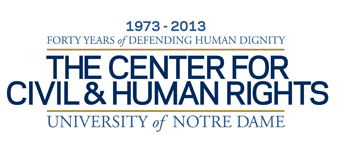The Center for Civil and Human Rights Announces New University-Wide Status
 The University of Notre Dame has taken a significant step toward realizing the ambitious vision of Rev. Theodore Hesburgh, C.S.C., for The Center for Civil and Human Rights as a university-wide, interdisciplinary Center of research and teaching on human rights.
The University of Notre Dame has taken a significant step toward realizing the ambitious vision of Rev. Theodore Hesburgh, C.S.C., for The Center for Civil and Human Rights as a university-wide, interdisciplinary Center of research and teaching on human rights.
Rev. Hesburgh founded the Center for Civil Rights at Notre Dame Law School in 1973. Its mission was to bring the University’s research and teaching to bear on those issues of justice that animated his own participation in the U.S. civil rights movements and his work as a founding member of the U.S. Commission on Civil Rights. In time the Center’s reach became global, extending to human rights issues affecting the human family worldwide, and its name was expanded accordingly to The Center for Civil and Human Rights. CCHR has built a stellar reputation as a premier program for educating human rights lawyers from all parts of the world through its LL.M. Program in International Human Rights Law.
Celebrating its 40th anniversary, The Center for Civil and Human Rights has announced the next stage in its development. While maintaining its traditional, close ties to the Law School, the CCHR now enjoys a new status as a collaborative effort of the Provost’s Office, the Law School, the Kellogg Institute for International Studies, and the Kroc Institute for Peace Studies. While the process to find a new CCHR Director is underway, the Directors of the Kellogg and Kroc Institutes, ex officio, will serve as Co-Directors and CCHR will continue with its existing staff located at the Law School.
J. Nicholas Entrikin, Vice President and Associate Provost for Internationalization, explained the significance of CCHR’s new role. “The contemporary challenges of global justice provide a unique opportunity for the University, and a university-wide CCHR is now positioned to meet those challenges,” he said. “We look forward to CCHR’s leadership and distinctive interdisciplinary contributions to Notre Dame’s work on human rights.”